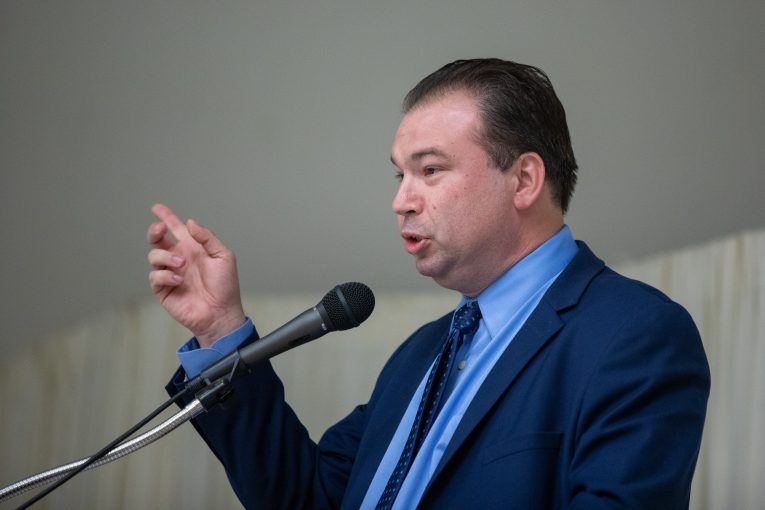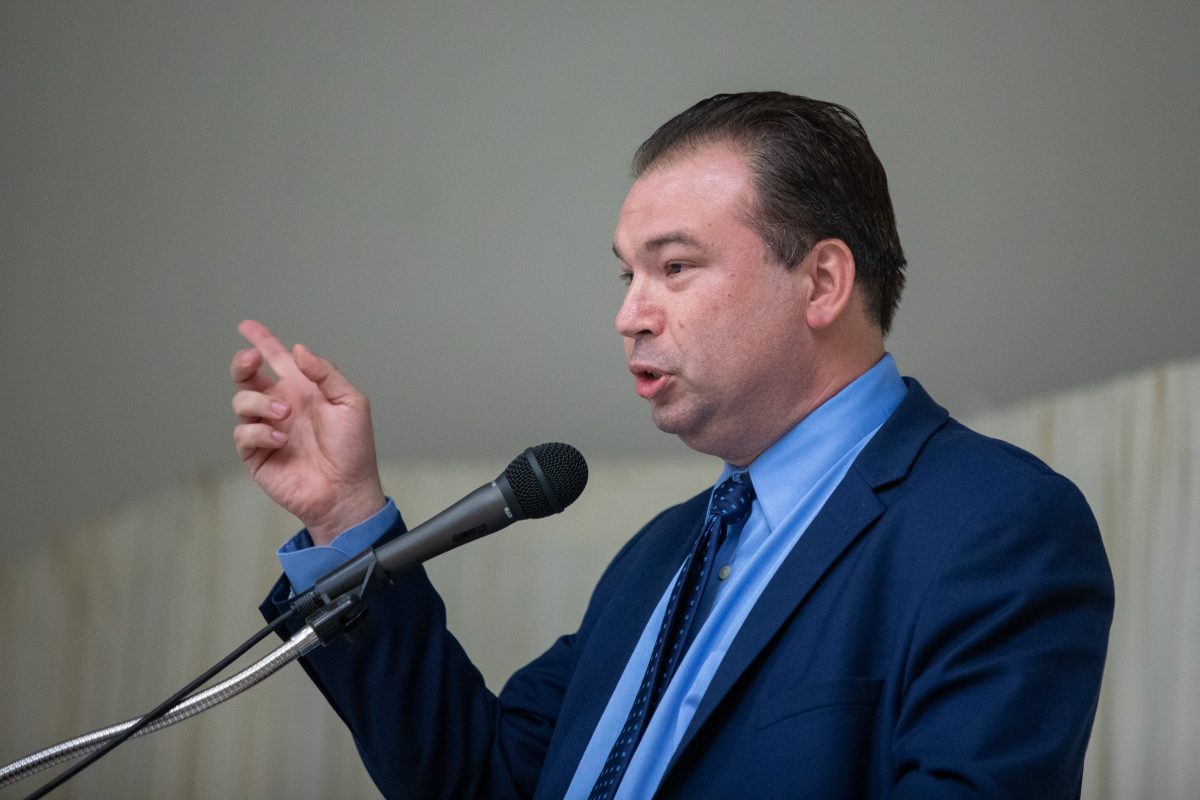

By Jeffrey Deskovic
“Looking back” will feature reprints of articles that Jeff previously wrote while a columnist at The Westchester Guardian, which encompass topics that are applicable here in CA as well as across the country and not simply applicable to NY.
On February 13, 2010, the State Legislature’s Black and Puerto Rican Caucus held a workshop on wrongful convictions in the Legislative Oce Building, Albany. By State Legislature rules, a member of the caucus needs to agree to add their name to the event, which is referred to as “sponsoring the event.”
Assemblywoman Crystal Peoples, who is from Erie County, sponsored the event, which was fitting considering that Anthony Capozzi and Lynn Dejac were wrongfully convicted in Erie County and exonerated, and are serving 20 and 13 years in prison, respectively.
The event was sponsored by New Yorkers For Alternatives To the Death Penalty, which is the new name for the former New Yorkers Against the Death Penalty. According to Colleen Eran, who is the statewide organizing director for the organization, ”We have expanded our mission. We now no longer simply oppose the death penalty, but are working with five key groups to bring about solutions to the problems of violence: victims’ families,  restorative justice advocates, law enforcement, mental health advocates, and prison families. By focusing on common ground solutions, we promote legislation and action that advances the well-being of all groups.”
restorative justice advocates, law enforcement, mental health advocates, and prison families. By focusing on common ground solutions, we promote legislation and action that advances the well-being of all groups.”
Interviewed by The Guardian, Executive Director David Kaczynski summed up the mission’s expansion, “We are focused on achieving more justice and less violence.”
Nathan Hare: Nathan Hare, the Executive Director of the Community Action Organization of Erie County which focuses on preventing violence, and a Board Member Of New Yorkers For Alternatives To the Death Penalty, was the organizer and moderator of the event.
Hare began by giving background information on wrongful convictions. He mentioned 25 DNA proven wrongful convictions in New York, and a number of non-DNA exonerations. He stated that the same factors which cause wrongful convictions in the DNA cases exist in the non-DNA cases. He postulated that there are a lot more wrongfully convicted people than we know about.
Senator Perkins: Senator Perkins,from Harlem, then entered the conference, and addressed the audience. Perkins recalled the Central Park Jogger case, in which 5 African American boys, ranging from 14 years old to 16, were arrested for raping a jogger. He mentioned how Donald Trump took out a full-page ad and referred to the kids as “animals” and called for the reinstatement of capital punishment. The boys had been coerced into making false confessions, and even though their statements differed from each other in material respects, they were convicted.
It was only when a convicted serial rapist Matias Reyes came forward and confessed to the crime, and the DNA matched him, that the boys were exonerated.
Senator Schneiderman:
Just as Perkins concluded, Senator Schneiderman, who is the Chairman of the Senate Codes Committee which focuses on the criminal justice system, arrived. He mentioned the need to record interrogations and to install better identification procedures. He recalled an incident when he was not the chairman, during a wrongful conviction hearing. Right after a couple of exonerees finished telling that they falsely confessed and were convicted, in support of legislation mandating recording interrogation, the Chairman got up and spoke against recording, stating, “But everybody knows that people don’t falsely confess. One or two of these people who just spoke in front of us may even have been guilty.” This incident was an example of what he encounters from his colleagues—“they have eyes but they can’t see. They have ears, but they can’t hear.” He therefore encouraged the audience members to speak to their representatives about what they heard that day about wrongful convictions.
Assemblyman Boyle:
Assemblyman Boyle was not scheduled to speak at the program, but he was present as an audience member. Hare invited him to speak spontaneously.
Boyle, a Republican, pointed out that wrongful convictions are a bi-partisan problem and that to solve it, it is necessary for Republicans and Democrats to work together. He thought that the cooperation would be there. Seeing Fernando Bermudez and myself in person, he said, further drove the problem home. I was impressed at Boyle’s attendance as an audience member, and regarded it as proof of the authenticity of his concern.
During my presentation, I mentioned serving 16 years wrongfully, despite a negative DNA test, being coerced into falsely confessing, and other evidence being fabricated, such as fraud by the medical examiner, and how my public defender was not very competent.
I explained that I was cleared by DNA implicating the real perpetrator, who also confessed. Driving home the point that a wrongful conviction could happen to anybody, I shared that I was not a high school dropout, I was actually on my way to school when initially intercepted by the police, and my friends were not involved in the crime. I had never been arrested before.
I mentioned having to adjust to technology, trying to rebuild family relationships, going to counseling, and finishing up a Masters Degree in Criminal Justice. The audience then spontaneously applauded. I shared being an advocate—speaking, writing, lobbying, testifying at hearings, and doing multimedia interviews.
I reviewed needed changes; recording interrogations, better identication procedures, a statewide evidence preservation system so that the DNA can be tested in those 10-12% of cases that exist rather than being lost or destroyed, criminalization of intentional prosecutorial misconduct, and a better public defense system than one in which it is not unusual for one lawyer to represent 120 clients simultaneously.
I recognized Raymond Santana’s presence in the audience, wrongfully arrested at 14 years old in the Central Park Jogger Case, and added I was happy he had been cleared. The audience cheered him.
Fernando Bermudez: Bermudez, barely home for two months, had gotten lost and arrived late. He spoke of being misidentified by five people; and the judge’s ruling that freed him; how the prosecution knew or should have known that the star witness against him had committed perjury throughout his testimony, and that the identification procedures were impermissibly suggestive. He echoed my sentiments on holding prosecutors accountable.
Arguing that the system is broken, he mentioned losing 10 appeals before winning the 11th, and how it took many lawyers working on his case over the years, adding that he was lucky because most people don’t have pro bono attorneys.
He closed by mentioning that he is still adjusting to being free; that he wakes up at night expecting a prison count, and that the wrongful conviction deeply affected his wife and family.
David Kaczynski told The Guardian that while on the phone with Bermudez trying to direct him, it was apparent that Bermudez was disoriented, fearful, and frustrated, conditions he said were attributable to his not being fully oriented to his new freedom.
Marie Verzola: Verzulli is a Victim/Survivor Advocate for NYADP, as part of their effort to make outreach to crime victims. She spoke of her sister’s murder by a serial killer and having to explain to her nephew about how his mother wasn’t coming home. What if the wrong person had been convicted? Both she and her nephew would have hurt her nephew worse. Based upon her many conversations with victims’ family members, she confidently said that they do not need the wrong person to be convicted.
“Jeffrey Deskovic, Esq, MA, is an internationally recognized wrongful conviction expert and founder of The Jeffrey Deskovic Foundation for Justice, which has freed 9 wrongfully convicted people and helped pass 3 laws aimed at preventing wrongful conviction. Jeff is an advisory board member of It Could Happen To You, which has chapters in CA, NY, and PA. He serves on the Global Advisory Council for Restorative Justice International, and is a sometimes co-host and co-producer of the show, “360 Degrees of Success.” Jeff was exonerated after 16 years in prison-from age 17-32- before DNA exonerated him and identified the actual perpetrator. A short documentary about his life is entitled “Conviction“, and episode 1 of his story in Virtual Reality is called, “Once Upon A Time In Peekskill“. Jeff has a Masters Degree from the John Jay College of Criminal Justice, with his thesis written on wrongful conviction causes and reforms needed to address them, and a law degree from the Elisabeth Haub School of Law at Pace University. Jeff is now a practicing attorney.
